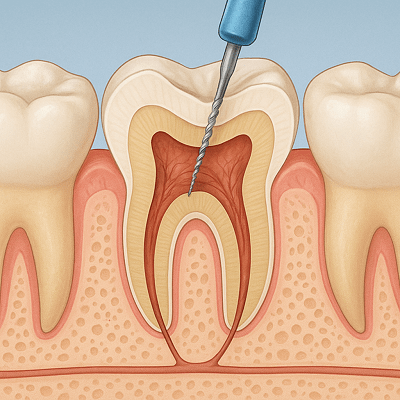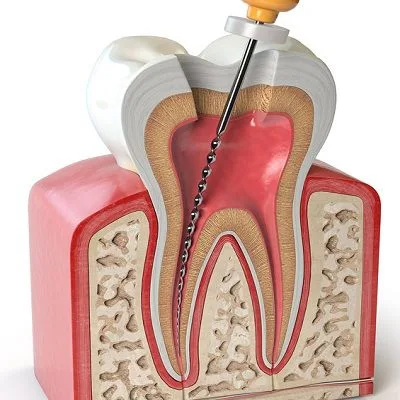
Save your natural tooth with gentle, pain-managed root canal therapy in Islamabad. If you’re struggling with severe toothache, lingering sensitivity, or swelling around a tooth, you may need a Root Canal treatment in Islamabad, Pakistan stop infection and prevent extraction. This guide explains everything: symptoms, procedure steps, cost in Islamabad, recovery tips, and how to choose the right dentist or endodontist.
What Is a Root Canal?
A root canal (endodontic therapy) is a dental procedure that removes infected or inflamed pulp from inside a tooth. After cleaning and disinfecting the root canals, the dentist fills and seals them to prevent reinfection. Most teeth treated with root canals are then protected with a dental crown to restore strength and function.
- What Is a Root Canal?
- Signs You Might Need a Root Canal:
- Root Canal Treatment in Islamabad: What to Expect:
- Benefits of Root Canal Therapy:
- Is a Root Canal Painful?
- Cost of Root Canal in Islamabad (2025 Guide)
- How to Choose the Best Dentist for Root Canal in Islamabad:
- Aftercare: Recover Faster With These Tips:
- Alternatives to a Root Canal:
- Common Myths vs. Facts:
- Who Is a Good Candidate?
- Post-Op Complications (Uncommon but Possible)
- Prevention: Keep Your Root Canal Tooth Healthy:
- Why Choose Our Islamabad Clinic for Your Root Canal:
- FAQ,S OF Root Canal Treatment:
Why It’s Done
- Eliminate infection and pain
- Prevent tooth loss and shifting of nearby teeth
- Restore chewing function and bite alignment
- Avoid repeated abscesses and jawbone damage
Signs You Might Need a Root Canal:
If one or more of these apply, schedule an evaluation promptly:
- Severe, throbbing tooth pain that worsens when chewing or at night
- Prolonged sensitivity to hot or cold (pain lingers after the stimulus is gone)
- Gum swelling, pimple/fistula on gums, or bad taste in the mouth
- Tooth discoloration (darkening)
- Deep decay, cracked tooth, or trauma history
- Tender or swollen lymph nodes near the jaw
Delaying treatment can spread the infection, increase costs, and reduce the chance of saving the tooth.
Root Canal Treatment in Islamabad: What to Expect:
Typical appointment structure
- Consultation & Diagnosis
- Digital X-rays or CBCT to assess the root anatomy and infection spread
- Vitality testing and bite assessment
- Treatment plan, timeline, and quote
- Anesthesia & Isolation
- Local anesthesia for a pain-managed procedure
- Rubber dam isolation to keep the area sterile and dry
- Access & Pulp Removal
- A small opening in the tooth crown
- Removal of infected pulp using endodontic instruments
- Cleaning & Shaping
- Mechanical shaping of canals
- Irrigation with antimicrobial solutions (e.g., sodium hypochlorite, EDTA)
- Optional medication placed inside the canals (for multi-visit cases)
- Filling (Obturation)
- Canals filled with gutta-percha and sealer
- Access cavity sealed with a temporary or permanent filling
- Final Restoration
- Most posterior teeth need a dental crown for strength
- Anterior teeth may sometimes be restored with a bonded filling +/- crown
Number of visits: Many cases finish in one visit; complex infections or multi-rooted teeth may need two visits with an interim medicament.
Benefits of Root Canal Therapy:
- Saves your natural tooth and maintains bite alignment
- Predictable pain relief once infection is controlled
- High success rate when followed by proper restoration (e.g., crown)
- Cost-effective compared to extraction + implant/bridge
- Aesthetics & function preserved, allowing normal chewing
Is a Root Canal Painful?
With modern local anesthesia and rotary instruments, most patients report minimal discomfort—often less than a tooth extraction. You may feel pressure or mild soreness for a day or two, manageable with over-the-counter pain relief unless your dentist advises otherwise.
Cost of Root Canal in Islamabad (2025 Guide)
Actual fees vary by Medixoaesthetics clinic, tooth type, imaging needs, and whether a crown is required. The table below shows typical estimated price ranges in Islamabad (PKR) to help you plan.
Estimated Cost Breakdown (Islamabad)
| Item / Factor | Typical Range (PKR) | Notes |
| Consultation & X-rays | 2,000 – 6,000 | CBCT (if needed) may add 6,000 – 15,000 |
| Root Canal – Incisor/Canine (Single Root) | 18,000 – 35,000 | Usually simpler anatomy |
| Root Canal – Premolar (1–2 Roots) | 25,000 – 45,000 | Complexity affects time & cost |
| Root Canal – Molar (3–4 Canals) | 35,000 – 65,000 | Most complex; often two visits |
| Re-treatment (Previously Treated Tooth) | 45,000 – 85,000 | Removal of old material; higher complexity |
| Post & Core (If Needed) | 5,000 – 15,000 | Reinforces heavily damaged teeth |
| Dental Crown (PFM / Zirconia) | 25,000 – 75,000 | Material & lab quality vary |
| Antibiotics/Pain Relief (If Prescribed) | 1,000 – 4,000 | Case-dependent |
Tip: Always ask for an itemized plan. A “lower” root canal quote without a crown may cost more long-term if the tooth fractures.
How to Choose the Best Dentist for Root Canal in Islamabad:
Use this checklist while comparing clinics:
- Endodontic Experience: Ask about the number of root canals performed weekly and experience with molars or re-treatments.
- Technology: Digital X-rays/CBCT, rubber dam, rotary/reciprocation systems, apex locator, and reliable irrigation protocols.
- Sterilization Protocols: Autoclave logs, single-use files where appropriate, and PPE standards.
- Transparent Pricing: Written estimates, crown options, and warranty/aftercare policies.
- Patient Reviews: Look for consistent feedback on pain control, communication, and timeliness.
- Emergency Access: Availability for flare-ups or post-op concerns.
Step-by-Step Timeline (From First Visit to Final Crown)
Day 0 – Consultation
- Assessment, imaging, consent, quotation. Emergency pain relief if needed.
Day 1 – Root Canal Procedure
- Anesthetize, clean, shape, disinfect, and obturate canals.
- Temporary filling placed.
Within 1–2 Weeks – Review
- Check healing; address any residual symptoms.
- Prepare tooth for crown (if indicated). Take impressions or digital scan.
Within 2–3 Weeks – Crown Placement
- Fit, adjust, and cement permanent crown.
Aftercare: Recover Faster With These Tips:
- Chew on the opposite side until the crown is placed to prevent cracking.
- Pain control: Take medications as prescribed. Mild soreness is normal for 24–72 hours.
- Oral hygiene: Brush gently around the area and resume flossing the next day.
- Warm saltwater rinses 2–3 times/day for the first 48 hours may soothe tissues.
- Watch for warning signs: Increasing swelling, fever, or severe pain—contact your dentist immediately.
- Don’t delay the crown: Restoring the tooth promptly reduces the risk of fracture or reinfection.
Alternatives to a Root Canal:
- Extraction: Removes the tooth but creates a gap. Nearby teeth can shift, affecting bite and aesthetics.
- Implant + Crown: Excellent long-term solution after extraction but costlier and requires adequate bone.
- Bridge: Replaces the missing tooth by preparing adjacent teeth.
- Partial Denture: Lower cost, removable option but less natural feel.
If your tooth is restorable and the surrounding bone is healthy, saving it with a root canal is often the most conservative, cost-effective choice.
Common Myths vs. Facts:
- Myth: Root canals are extremely painful.
Fact: With anesthesia and modern techniques, most patients experience only mild discomfort. - Myth: Extraction is easier and cheaper.
Fact: Upfront extraction may be cheaper, but replacing a missing tooth (implant/bridge) is typically more expensive than saving your natural tooth. - Myth: Root canals always fail.
Fact: Success rates are high, especially when a quality crown is placed and regular checkups are maintained.
Who Is a Good Candidate?
- Tooth has deep decay, crack, or trauma with pulp involvement
- X-rays show infection around the root tip (periapical radiolucency)
- Tooth structure is sufficient to hold a filling or crown after treatment
- No uncontrolled systemic conditions that contraindicate dental procedures (your dentist will review your medical history)
Post-Op Complications (Uncommon but Possible)
- Post-op flare-up: Temporary swelling or severe pain due to residual bacteria or inflammation
- Instrument separation: A file may break inside a canal; often managed successfully by an experienced endodontist
- Missed canal: Additional anatomy may exist; CBCT can help identify and treat
- Fracture: Risk increases if a crown is delayed on posterior teeth
- Reinfection: May require re-treatment or apicoectomy
Selecting a skilled provider and following aftercare instructions significantly reduce these risks.
Prevention: Keep Your Root Canal Tooth Healthy:
- Twice-daily brushing with fluoride toothpaste
- Daily flossing or a water flosser
- Professional cleaning and checkups every 6 months
- Nightguard if you grind/clench (bruxism)
- Limit sugary snacks and acidic beverages
Why Choose Our Islamabad Clinic for Your Root Canal:
- Experienced Team: Dentists with advanced endodontic training
- Comfort-First Care: Gentle anesthesia, patient-centric communication
- Modern Equipment: Rotary/reciprocation, apex locators, digital radiography/CBCT
- Fair, Transparent Fees: Written plans, multiple crown materials, and flexible payments
- Emergency Slots Daily: Same-day relief for acute pain where possible
FAQ,S OF Root Canal Treatment:
Do I always need a crown after a root canal?
Posterior teeth (premolars/molars) usually do—chewing forces are high. Some front teeth can be restored with a bonded filling, but your dentist will advise based on remaining tooth structure.
How long will the treated tooth last?
With a proper crown, good hygiene, and regular checkups, many root canal teeth last for 10+ years—often much longer.
Can antibiotics alone cure the infection?
No. Antibiotics may control symptoms temporarily but cannot remove infected pulp inside the tooth. Mechanical cleaning and sealing of canals are essential.
Is it safe during pregnancy?
Emergency dental care is often safe with proper precautions. Timing and imaging are planned carefully; always inform your dentist and obstetrician.
What if my pain returns after treatment?
Mild soreness is normal. If pain persists or returns months later, contact your dentist—re-treatment or further evaluation may be needed.
Will insurance cover it?
Coverage varies. Ask your insurer and request a pre-authorization. Clinics often provide installment options to help with budgeting.
Book your consultation!
Call/WhatsApp: [+92 327 5479779]
Visit: [Address: Office Number LG 20 – 21 Interlace Plaza I-8 Markaz Islamabad]









